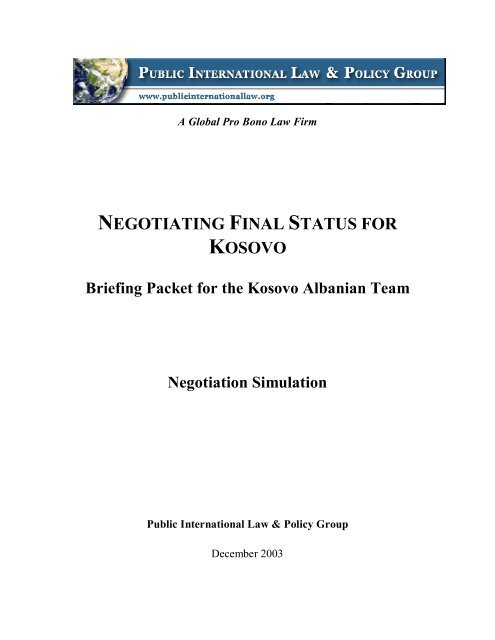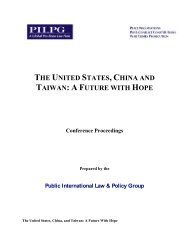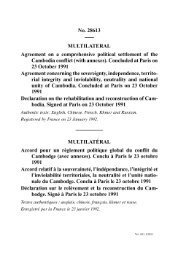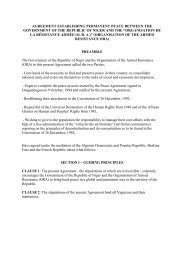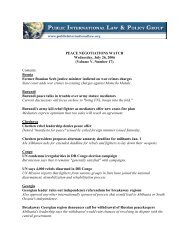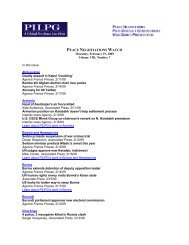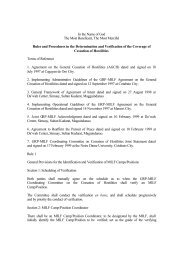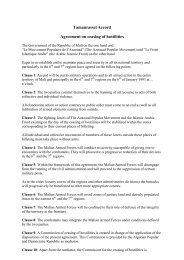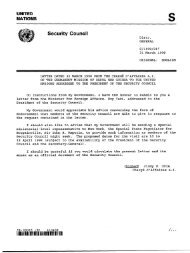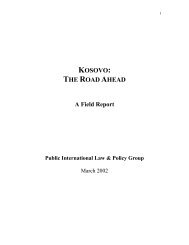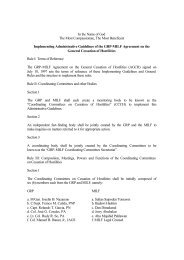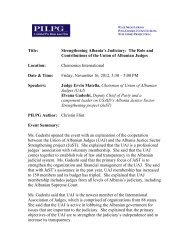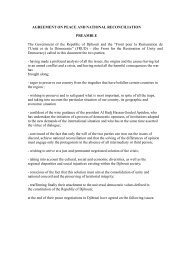Kosovo Albanian Delegation Negotiation Briefing Packet
Kosovo Albanian Delegation Negotiation Briefing Packet
Kosovo Albanian Delegation Negotiation Briefing Packet
Create successful ePaper yourself
Turn your PDF publications into a flip-book with our unique Google optimized e-Paper software.
A Global Pro Bono Law Firm<br />
NEGOTIATING FINAL STATUS FOR<br />
KOSOVO<br />
<strong>Briefing</strong> <strong>Packet</strong> for the <strong>Kosovo</strong> <strong>Albanian</strong> Team<br />
<strong>Negotiation</strong> Simulation<br />
Public International Law & Policy Group<br />
December 2003
2<br />
OVERVIEW<br />
Resolving the issue of <strong>Kosovo</strong>'s final status will be complicated by two enduring facts:<br />
the absence of overlap between the stated objectives of the Serbs and the <strong>Albanian</strong>s, the<br />
two major peoples directly involved in the disputed area; and the inability of the<br />
international community to make up its mind about its preferred outcome. If these two<br />
conditions continue to prevail, resolution of <strong>Kosovo</strong>’s final status is likely to be<br />
prolonged, difficult, characterized by posturing on all sides, and marked by procedural<br />
points advanced to mask the fundamental political issues which the international<br />
community has consistently avoided facing.<br />
<strong>Negotiation</strong>s over <strong>Kosovo</strong>'s future status could be almost as contentious within the<br />
international community as between the two parties themselves. It is possible that the<br />
international community will be unable to come up with a unified position, at least on<br />
some key issues. The U.S. role will be critical. Experience at Dayton, Rambouillet,<br />
Skopje and elsewhere has shown that where the United States takes the lead, it can<br />
usually bring along the internationals and the locals. When the United States hangs back,<br />
achieving agreement at anything other than the least common denominator level is<br />
difficult.<br />
Unfortunately, Washington continues to lack a consistent policy on <strong>Kosovo</strong>. Three<br />
factors shape Washington's current approach toward <strong>Kosovo</strong> and the Balkans generally:<br />
—Preoccupation of senior policy officials with other parts of the world;<br />
—A shift in working-level personnel dealing with the region away from those with<br />
experience during the conflicts of the 1990s;<br />
—Willingness in some parts of the bureaucracy to consider all options, even patently<br />
unrealistic ones such as returning <strong>Kosovo</strong> to some form of loose association with<br />
Belgrade, either out of ignorance of the region or because of new notions of U.S. security<br />
interests.<br />
The absence of leadership in Washington has left the lead in <strong>Kosovo</strong> in recent years to<br />
the EU but Brussels, unfortunately, is just as divided and directionless about <strong>Kosovo</strong> as<br />
Washington. The new UNMIK chief, former Finnish president Harri Holkeri is said to be<br />
determined to take the lead in the upcoming talks between Belgrade and Pristina but<br />
history has shown that UN leadership is no panacea for resolving international problems.<br />
This has nothing to do with the capabilities of the individuals involved, which are<br />
sometimes quite high, but rather the lack of an institutional structure allowing decisive<br />
action within the UN itself and the inability of the UN to adopt actions without a<br />
consensus among the members of the Security Council. UNMIK under Holkeri may take<br />
the lead as long as the upcoming talks remain focused on technical issues but not once<br />
they begin to touch on vital political or security issues of the major players.<br />
In theory, there are two ways the “gateway” issue of independence could be treated. One<br />
would be to try to resolve this difficult issue first, recognizing that once it was out of the<br />
way other issues would fall into place more easily. The other approach would be to put it
3<br />
off for later resolution and to begin the talks with other issues, in an effort to build a<br />
sense of confidence and momentum before tackling the hard issue of independence.<br />
The international community has opted for the second approach—at least for now—by<br />
deciding to begin talks between Belgrade and Pristina on technical issues which, it is<br />
said, will then in some vague fashion evolve into talks on <strong>Kosovo</strong>’s future political status.<br />
The last UNMIK chief, Michael Steiner, apparently adopted the notion of beginning with<br />
talks on technical issues as a way to get the issue off square one in the absence of any<br />
effective policy leadership in either Washington or Brussels. It was also predicated on<br />
the notion that Serbian Prime Minister Zoran Djindjic was a pragmatic politician with<br />
whom it would be possible to work to achieve a realistic outcome in <strong>Kosovo</strong>. Now, with<br />
Djindjic dead and with a divided and weak leadership structure in Belgrade that seems<br />
driven by hard-line political posturing, prospects for this approach appear questionable at<br />
best. The situation in Pristina is not much better. The <strong>Kosovo</strong> <strong>Albanian</strong> leadership is<br />
united on independence as the only acceptable outcome but is internally divided on<br />
almost everything else and seems to have no concept of tactics or strategy for how to get<br />
to its goal. The surge in recent weeks of terrorist violence in <strong>Kosovo</strong>—although its<br />
origins are unclear—could also be a constraining factor on the willingness of the <strong>Kosovo</strong><br />
<strong>Albanian</strong> leadership to compromise.<br />
Many countries outside the region—including some leading members of the international<br />
community—fear <strong>Kosovo</strong> independence because of the potential impact on break-away<br />
regions in their own countries. These sentiments are seldom expressed openly but can<br />
have a powerful effect on the way representatives of these countries approach the issue of<br />
<strong>Kosovo</strong>'s final status. “<strong>Kosovo</strong> can never be independent,” is the refrain with the<br />
unstated subtext being, “and neither can Corsica, the Basque region, Chechnya, nor<br />
Quebec.”<br />
Regional issues are another complication. The neighbors of <strong>Kosovo</strong> have a strong<br />
interest in the outcome of the negotiations but are unlikely—at least initially—to be<br />
invited. The potential impact that changes in the political status or borders of <strong>Kosovo</strong><br />
could have on Macedonia, Bosnia, and Albania is well understood both by regional and<br />
international players. It has always been one of the strongest arguments against major<br />
changes in <strong>Kosovo</strong>'s status. If, on the other hand, the situation on the ground or the<br />
dynamics of the negotiation lead toward changes in <strong>Kosovo</strong>'s status or borders, pressure<br />
could build to broaden the agenda and the participation of the talks beyond <strong>Kosovo</strong> alone.<br />
During the 1990s the notion of “ancient ethnic animosities” often served as an excuse for<br />
diplomatic inaction but in the case of <strong>Kosovo</strong> it is a real factor. Serbs and <strong>Albanian</strong>s<br />
genuinely dislike one another—and events over the past few decades have given both<br />
groups grounds for antagonism. Good personal relations between some Serb and<br />
<strong>Albanian</strong> negotiators are possible—some of the DOS leaders and the non-KLA <strong>Albanian</strong><br />
leaders have known each other for years, going back to the days of the old Yugoslavia,<br />
when both constituted part of the so-called “alternative” to the Communists and then to<br />
Milosevic. But the distrust between the two peoples is deep and not easily bridged. It<br />
will affect the atmosphere and the substance of the talks in a range of tangible and
4<br />
intangible ways. <strong>Albanian</strong>s will cite Serb abuses going back to Milosevic's forcible<br />
suppression of the province’s autonomy in 1989 as a justification for independence, while<br />
Serbs will cite the post-1999 war revenge attacks on <strong>Kosovo</strong> Serbs as one reason why the<br />
<strong>Albanian</strong>s cannot be trusted with independence. In a broader vein, the record of violence<br />
will lend urgency to the perceived need of both sides for firm security arrangements,<br />
make minority rights issues more salient, and add strength to various partition options<br />
since—after the events of the past 15 years—few Serbs or <strong>Albanian</strong>s can conceive of<br />
living together.<br />
Another potential danger is that the talks could drag on indefinitely, leading to impatience<br />
and fueling extremism on both sides. The absence of high-level political engagement by<br />
the United States would make such a result almost a certainty. Even under the most<br />
optimistic scenarios—international unity and the two parties negotiating seriously—<br />
serious roadblocks can be anticipated at various points in the talks, which will require<br />
engagement at the Foreign Minister or the Chief of State level to overcome. It is also<br />
possible that one of the local parties might decide to spin out negotiations. If the<br />
<strong>Albanian</strong>s, for example, became convinced that independence was genuinely off the table<br />
they might see continuation of the talks as the best way to retain KFOR in <strong>Kosovo</strong> and to<br />
buy time to prepare for resumed conflict if Belgrade were allowed to return to <strong>Kosovo</strong>.<br />
Both Serbs and <strong>Albanian</strong>s bring a lot of baggage to the talks. The emotional importance<br />
that both attach to the issue, the existence within both communities of sharp political and<br />
personality differences, and the strain of violence within both communities will make it<br />
hard for leaders on each side to compromise.<br />
Nevertheless, the fact that all <strong>Albanian</strong>s insist that <strong>Kosovo</strong> must become independent<br />
within its current borders and (virtually) all Serbs insist that <strong>Kosovo</strong> must remain part of<br />
Serbia does not mean that either side believes its professed preference is the only<br />
acceptable outcome. With enough pressure and patience some compromise is possible.<br />
Each side, however, also has red lines beyond which it will not go.<br />
On the <strong>Albanian</strong> side, the most important red line is the return of Belgrade’s rule in any<br />
real capacity. <strong>Albanian</strong>s will insist on the trappings and reality of complete self-rule.<br />
They will not allow Belgrade’s representatives any role in Pristina—even a symbolic one.<br />
Nor will they send their own people to any kind of common institutions in Belgrade—<br />
except perhaps in a transition arrangement. <strong>Albanian</strong>s will also insist on some kind of<br />
international security guarantees against Belgrade’s future return. Their demand will be a<br />
permanent NATO presence that includes U.S. troops. They might conceivably settle for<br />
some kind of European military presence, provided it was accompanied by security<br />
guarantees to which the U.S. was also a party. <strong>Albanian</strong>s will initially be willing to grant<br />
<strong>Kosovo</strong> Serbs just what Belgrade says it will give them—full minority rights. But<br />
<strong>Albanian</strong>s might be willing to allow <strong>Kosovo</strong> Serbs special status, including some limited<br />
territorial jurisdictions—Serb schools, health care, and police—provided these Serb<br />
“cantons” are legally part of <strong>Kosovo</strong> and report to Pristina and not to Belgrade.
5<br />
Serbs also have some red lines in <strong>Kosovo</strong>. The first is the northern part of <strong>Kosovo</strong>,<br />
which only became part of the province in 1957, has always been predominantly Serbinhabited,<br />
and which international inaction allowed to become a Serb fiefdom after the<br />
1999 war. No Belgrade government will allow the north of <strong>Kosovo</strong> to return to<br />
unrestricted rule by an <strong>Albanian</strong> government in Pristina. At a minimum, Belgrade will<br />
insist on some kind of autonomous status for the north, including the northern part of the<br />
divided city of Mitrovica. In the context of an otherwise acceptable settlement, Serbs<br />
might be willing to allow Mitrovica to be united under some kind of special status under<br />
continued international control. As a practical matter, however, the existing dividing line<br />
will probably continue for some time, even under the most optimistic scenarios.<br />
Another Serb red line is the retention of some kind of special rights for the major Serb<br />
shrines in the southern part of <strong>Kosovo</strong>. The Pec Patriarchate and the Decani and<br />
Gracanica monasteries are the most important but the Serbs will come in with a much<br />
longer list. Serbs will insist on extraterritorial status for the shrines if <strong>Kosovo</strong> separates<br />
from Serbia and on some kind of Serb security presence at the shrines under any option.<br />
<strong>Albanian</strong>s will resist extraterritoriality but might eventually agree to a symbolic Serb<br />
security presence, provided they got an acceptable deal on status and Western security<br />
guarantees. Belgrade will also insist on special rights for the population of the Serb<br />
enclaves in the south but might eventually fall off since Belgrade cares little for the Serbs<br />
of <strong>Kosovo</strong> and most Serbs in the south would, in any case, leave if they believed they<br />
were going to be ruled by <strong>Albanian</strong>s.<br />
Leaving aside “symbolic” issues such as flag, seat at the UN, and national anthem about<br />
which both sides are capable of expending endless time in arguments—two underlying<br />
issues are likely to drive the talks: security and partition. There is a dynamic at work on<br />
both issues. The more secure <strong>Kosovo</strong> <strong>Albanian</strong>s feel against a return of Belgrade’s rule<br />
the more willing they will be to make concessions in other areas.<br />
Given the separation in which the <strong>Albanian</strong> and Serb communities in <strong>Kosovo</strong> exist and<br />
the continued hostility and violence between them, some kind of separation is inevitable,<br />
although the word and the concept of “partition” will likely be anathema to <strong>Albanian</strong>s<br />
and some in the international community, at least initially. The issue is whether the north<br />
separates entirely from <strong>Kosovo</strong> and rejoins Serbia or whether the north becomes some<br />
kind of autonomous “Krajina” within a separate <strong>Kosovo</strong>. Sub-sets of the partition issue<br />
are Mitrovica city and the Serb enclaves in the south, with acceptable outcomes in both<br />
areas depending on how a range of other issues are settled.<br />
Full legal independence for <strong>Kosovo</strong> virtually guarantees a Serb effort to split the north<br />
away. Options less than full independence will increase Belgrade’s willingness to allow<br />
the north to remain part of <strong>Kosovo</strong> but, conversely, will increase Pristina's insistence on<br />
“its” issues in the north—Trepca, return of expelled <strong>Albanian</strong>s, control over Mitrovica.<br />
Modalities<br />
Modalities are likely to be very important and delicate in the initial stages of <strong>Kosovo</strong><br />
status talks. Both the Serb and the <strong>Albanian</strong> sides will try to push their long-range
6<br />
political objectives through ostensibly procedural issues. The auspices under which the<br />
talks will be held is likely to be the venue for the first procedural skirmish, which in<br />
reality will mask a more fundamental struggle over whether or not independence is on the<br />
table. The Serbs and their backers in the international community will insist that any<br />
agreement reached in the talks must be ratified in a UNSC Resolution and that no<br />
solution can go beyond the parameters of UNSC 1244. <strong>Albanian</strong>s will insist that UNSC<br />
1244 is not determining with respect to <strong>Kosovo</strong>’s final status and, in general, will try to<br />
keep the UN’s involvement to a minimum, recognizing that there is little chance of<br />
gaining UNSC agreement to a deal that grants independence to <strong>Kosovo</strong>.<br />
A critical issue, which the international community and the <strong>Kosovo</strong> <strong>Albanian</strong>s will have<br />
to face even before the technical talks begin, will be status and the composition of the<br />
Kosovar delegation. The current <strong>Kosovo</strong> constitutional framework allows Kosovars only<br />
limited role in foreign affairs. Efforts by the <strong>Kosovo</strong> <strong>Albanian</strong>s to go beyond this have<br />
been slapped down hard by UNMIK. Up to now <strong>Kosovo</strong> delegations to international<br />
meetings, such as the recent EU summit at Thesaloniki have actually been led by<br />
UNMIK, which exercises legal sovereignty in <strong>Kosovo</strong>.<br />
<strong>Kosovo</strong> <strong>Albanian</strong>s have gone along with these arrangements in part because they had<br />
little option and in part because they recognize that little of vital importance is<br />
accomplished at these international confabs. Their attitude will be quite different toward<br />
the upcoming talks with Belgrade. <strong>Kosovo</strong> <strong>Albanian</strong>s will not and should not participate<br />
in discussions which affect their vital issues without being in control of their own<br />
delegation. A structure for the current talks in which the UN heads a delegation which<br />
negotiates with Belgrade on behalf of the <strong>Kosovo</strong> <strong>Albanian</strong>s would have no legitimacy in<br />
the eyes of either the <strong>Kosovo</strong> <strong>Albanian</strong> leaders or the population at large.<br />
The notion of opening talks on technical issues, such as transportation or travel<br />
documents represents both opportunities and pitfalls. Dealing seriously and substantively<br />
with such technical issues would allow the <strong>Kosovo</strong> <strong>Albanian</strong>s to demonstrate their<br />
“reasonableness” and lend weight to their pleas to be given greater control over their own<br />
destiny. On the other hand, Belgrade will seek to limit talks only to such issues, arguing<br />
that <strong>Kosovo</strong>’s political status is determined by Serbia’s new constitution and is not<br />
something for negotiation. The international community will also seek to limit initial<br />
talks to technical issues, in part because there is no consensus on what to do about the<br />
broader issues of <strong>Kosovo</strong>'s future and in part because some—probably most—members<br />
of the international community support Belgrade’s position. <strong>Kosovo</strong> <strong>Albanian</strong>s, by<br />
contrast, cannot afford to participate in talks expressly limited to technical issues without<br />
some guarantee that all options regarding political status will be on the table in the future.<br />
What this means is that the <strong>Kosovo</strong> <strong>Albanian</strong>s even before the technical talks begin will<br />
have to work out their own position on two difficult and complex issues, both of which<br />
threaten to bring them into a conflict with the international community. <strong>Kosovo</strong><br />
<strong>Albanian</strong>s will need to work out a position that allows them to control their own<br />
delegation and also allows technical issues to be addressed without prejudice to broader<br />
political and economic issues associated with future status. <strong>Kosovo</strong> <strong>Albanian</strong>s will have
7<br />
to stake out their own positions on these points in the face of likely strong international<br />
pressure without entering into an open confrontation with the international community or<br />
allowing themselves to be pushed into the position of seeming to be intractable in<br />
comparison with Belgrade.<br />
Participants<br />
Serbs will seek to avoid the impression of talks between two equal parties and will do as<br />
much as possible to foster the impression that the talks are between the center and one of<br />
its constituent parts. Serbs will likely seek to keep the international role limited to<br />
something like “good offices” or “facilitator,” although they would be happy to construct<br />
the talks between themselves and the international community, with the <strong>Kosovo</strong><br />
<strong>Albanian</strong>s in a subordinate status. One ploy in this direction would be to insist that<br />
<strong>Kosovo</strong> Serbs and <strong>Kosovo</strong> <strong>Albanian</strong>s each participate as separate and equal subdelegations.<br />
Belgrade might also resurrect Milosevic’s old tactic of insisting on equal<br />
representation for minority “communities” in <strong>Kosovo</strong>, including Turks and the various<br />
sub-categories of Roma. The Serbs may also float their own concept of “regional” talks,<br />
which would include states sympathetic to the Serb position on <strong>Kosovo</strong>, such as<br />
Macedonia, Bulgaria, and Greece.<br />
<strong>Kosovo</strong> <strong>Albanian</strong>s, by contrast, would prefer to keep Belgrade’s role in talks on future<br />
status to a minimum, arguing that the final settlement is between the people of <strong>Kosovo</strong><br />
and the international community. <strong>Kosovo</strong> <strong>Albanian</strong>s have accepted the concept of talks<br />
on technical issues but they will resist direct talks between them and Belgrade alone and<br />
insist that the international community be fully in charge of the negotiating process at all<br />
stages. <strong>Kosovo</strong> <strong>Albanian</strong>s will be ambivalent on the form of <strong>Kosovo</strong> Serb participation.<br />
They will resist allowing the <strong>Kosovo</strong> Serbs to be part of the Belgrade delegation because<br />
of the implication that Belgrade has the right to represent the interests of any citizens of<br />
<strong>Kosovo</strong>. On the other hand, <strong>Kosovo</strong> <strong>Albanian</strong>s would welcome anything which tends to<br />
confirm that the <strong>Kosovo</strong> Serbs are not independent actors but, in fact, are acting under the<br />
direction of Belgrade.<br />
The history of diplomatic negotiations over the past decade in the Balkans shows that<br />
achieving an agreement requires the U.S. to take the lead role and devote major political<br />
capital to the process. <strong>Kosovo</strong> <strong>Albanian</strong>s will insist that the U.S. be at least a co-chair of<br />
any negotiating process and may condition their own participation on such a U.S. role.<br />
Ironically, Belgrade may also support a strong US leadership role in the talks, if it sees<br />
U.S. policy shifting away from sympathy toward the <strong>Kosovo</strong> <strong>Albanian</strong> cause.<br />
Venue<br />
This is likely to be one of the earliest and most stubborn areas where procedural<br />
arguments mask deeper substantive differences. Belgrade, together with much of<br />
international community, will probably take the position that the talks should be held<br />
under UN auspices, that any agreement must be codified in a UNSC resolution, and that<br />
the task of the talks is to discuss complete implementation of UNSC 1244 but nothing<br />
more. This strategy will be facilitated by the concept of technical talks led by the UN.
8<br />
<strong>Albanian</strong>s will need to find a way to participate constructively in technical talks without<br />
allowing this to undermine or divert the process from broader political objectives. They<br />
will insist that UNSC 1244 only deals with interim status for <strong>Kosovo</strong> and that final status<br />
goes beyond the provisions of UNSC 1244. Once the talks go beyond strictly “technical”<br />
issues, <strong>Albanian</strong>s will seek to hold them under some kind of ad hoc group which they<br />
believe that the U.S. can dominate, such as the Contact Group. The <strong>Albanian</strong>s will also<br />
try to bring forward aspects of the deal they accepted—or claim they accepted—at<br />
Rambouillet and Paris, especially the concept that the “will of the people” should figure<br />
in the determination of <strong>Kosovo</strong>’s final status and the notion of a three-year period for<br />
reaching a decision. They will seek to ignore aspects of Rambouillet they did not like,<br />
such as its constitutional provisions regarding minority communities.<br />
Timing<br />
<strong>Kosovo</strong> <strong>Albanian</strong>s seek a road map that points the way toward resolution of final status.<br />
If an agreement is reached, the international community will not be out of the woods—or<br />
out of <strong>Kosovo</strong>—yet. Implementation of any agreement will require a prolonged<br />
international civilian and military presence. <strong>Kosovo</strong>’s current status as an international<br />
protectorate will be gradually reduced even before final status negotiations conclude, as<br />
more authority is transferred to democratically elected <strong>Kosovo</strong> representatives. The<br />
international community will need to come up with a mechanism to cover a continued—<br />
although diminished—role, which will likely include enforcing implementation of the<br />
terms of an agreement, monitoring political and human rights developments, and security.<br />
Serious money will continue to be needed after an agreement for economic restructuring<br />
and investment. It would make little sense to spend the time and effort to gain some kind<br />
of agreement on final status only to see it collapse under the strain of economic<br />
difficulties in <strong>Kosovo</strong> and in Serbia.
9<br />
SIMULATION SCHEDULE<br />
Location: Grand Hotel<br />
9:30 Coffee and snack available for participants<br />
10:00-10:10 Introduction and review of simulation schedule and procedures—Plenary<br />
Room<br />
10:10-10:45 Individual team meetings to set strategy<br />
1030-11:00 International Team 1 meets with Serbians<br />
International Team 2 meets with <strong>Albanian</strong>s<br />
Small group meeting of some Serbian team members and <strong>Albanian</strong>s if agreed to<br />
by both parties and mediated by International Team 3<br />
11:00-11:45 First Plenary<br />
11:45-12:30 Individual team meetings to re- focus strategy (lunch will be provided during this<br />
meeting)<br />
12:30-1:15 Small Group Meetings as determined by International Team<br />
1:15-2:00 Second Plenary<br />
2:00-2:30 Review and Lessons Learned
10<br />
TEAM SCENE SETTER<br />
All members of the <strong>Kosovo</strong> <strong>Albanian</strong> team, regardless of their political orientation, will<br />
share the objective of full, de jure independence as the preferred outcome of the talks.<br />
Compromise within the delegation on this issue will be hard, given the likelihood that<br />
anyone who did would face accusations of betrayal of <strong>Albanian</strong> national interests. All<br />
members of the delegation will likely insist on following the Rambouillet agreement<br />
precedent of a three year period followed by a referendum on <strong>Kosovo</strong>'s future. There<br />
may be a certain amount of flexibility on tactics and timing within the delegation.<br />
The relationship of the <strong>Albanian</strong> negotiating team to UNMIK could be an issue. Under<br />
the constitutional framework, the Provisional Institutions of Self-Government have<br />
certain responsibilities in the field of external relations, including the negotiating and<br />
finalizing of agreements, but these activities are to be coordinated with the UNMIK chief.<br />
In any case, the <strong>Kosovo</strong> <strong>Albanian</strong>s will not recognize the UN’s legitimacy to speak for<br />
them on the issue of <strong>Kosovo</strong>'s future status. Both UNSC 1244 and the constitutional<br />
framework appear to specify that the UN exercises its authority in <strong>Kosovo</strong> pending a final<br />
settlement, which would appear to limit UNMIK’s role in negotiations over a final<br />
settlement.<br />
The place of the <strong>Kosovo</strong> Serbs will be a major issue in the composition of the <strong>Kosovo</strong><br />
delegation. Logically, the <strong>Kosovo</strong> Serbs should be part of one <strong>Kosovo</strong> delegation and it<br />
is possible that Belgrade and some in the international community will insist on it. As a<br />
practical matter, neither <strong>Kosovo</strong> Serbs nor <strong>Albanian</strong>s will trust each other or be willing to<br />
work together in a realistic fashion as part of one delegation, even if international<br />
pressure forced them to sit together at the table.<br />
The UN may insist that the <strong>Kosovo</strong> negotiating team include representative(s) of the<br />
minority communities in <strong>Kosovo</strong>, such as the Turks, Roma, and Gorani. <strong>Kosovo</strong><br />
<strong>Albanian</strong>s might not resist but would seek to ensure that any minority representatives<br />
would tilt in their direction. If Belgrade also sought to include “its” <strong>Kosovo</strong> minority<br />
representatives in the talks, the question of who speaks for these communities and their<br />
place on the delegation could be an early issue.
11<br />
NEGOTIATING THE ISSUES<br />
1) KOSOVO FINAL STATUS<br />
Objective:<br />
• Full, de jure independence for <strong>Kosovo</strong>, with its own seat in the UN and diplomatic<br />
recognition by other states.<br />
Acceptable minimum:<br />
• De facto independence from Belgrade, complete local self-rule with security provided<br />
by an international military presence under the umbrella of some kind of nominal<br />
international protectorate status.<br />
Background<br />
Independence will be the overriding objective of all members of the <strong>Kosovo</strong> <strong>Albanian</strong><br />
delegation. <strong>Kosovo</strong> <strong>Albanian</strong>s will probably demonstrate little flexibility on any solution<br />
short of independence until very late in the talks and even then only in the context of<br />
heavy U.S. pressure coupled with favorable resolution of other issues of concern to them,<br />
such as the territorial integrity of <strong>Kosovo</strong>, continued NATO security presence, and the<br />
absence of any substantive role for Belgrade in <strong>Kosovo</strong>. Independence is such a sensitive<br />
issue that compromise on it could provoke splits within the delegation and violence<br />
within <strong>Kosovo</strong> itself. Since any <strong>Kosovo</strong> <strong>Albanian</strong> delegates who agreed to an outcome of<br />
less than full independence could have legitimate grounds for worry about their political<br />
future and personal security, this will obviously reduce incentive for compromise on the<br />
final status issue. A settlement based on less than full independence, moreover, could<br />
provoke such instability in <strong>Kosovo</strong> that it would be difficult, if not impossible to<br />
implement.<br />
2) MITROVICA AND BORDERS<br />
Objectives:<br />
• Retain <strong>Kosovo</strong> as a single, unified entity within its current borders.<br />
• Regain control of Mitrovica city and the near-by Trepca metallurgical complex and<br />
eliminate the illegal Serb administration that currently controls northern Mitrovica<br />
and the northern part of <strong>Kosovo</strong>.<br />
Acceptable Minimums:<br />
• Retain <strong>Kosovo</strong> in its current boundaries except for the three northern municipalities,<br />
which have always been predominantly Serb populated and which did not join<br />
<strong>Kosovo</strong> until 1957.<br />
• Mitrovica city remains part of <strong>Kosovo</strong> but under international administration.<br />
• Shared access and management of Trepca with Belgrade.
12<br />
Background<br />
<strong>Albanian</strong>s will insist that <strong>Kosovo</strong> remain united within its current borders and will<br />
initially insist on the return of the three northern municipalities, from which virtually all<br />
of the small number of <strong>Albanian</strong>s who lived there before the 1999 conflict have been<br />
expelled and which has come under the informal control of local Serbs backed by<br />
Belgrade. <strong>Albanian</strong>s are realistic enough to understand, however, that regaining effective<br />
control of the north will take time if it happens at all. Provided <strong>Kosovo</strong> remains united<br />
(either as an independent state or a protectorate) <strong>Albanian</strong>s would be willing to allow<br />
some kind of local autonomy to the Serb-dominated north, provided Serbs there<br />
recognized Pristina’s suzerainty. <strong>Albanian</strong>s will be reluctant to agree to a de jure<br />
partition of <strong>Kosovo</strong> but at the end of the day might be willing to let the northern<br />
municipalities go if that was the price of independence and provided the <strong>Albanian</strong> portion<br />
of <strong>Kosovo</strong> received the necessary international security and economic guarantees.<br />
<strong>Albanian</strong>s will resist to the end any efforts to extend the partition zone to the Serbinhabited<br />
entities in central and southern <strong>Kosovo</strong>, as some Serbs have advocated. If<br />
partition becomes a real possibility, the Serb inhabitants of the entities may well find<br />
themselves exposed to violence intended to drive them out. Partition would also almost<br />
certainly encourage the activities of extremist elements within the <strong>Albanian</strong> community<br />
and might also lead to efforts to rekindle the uprising in the heavily <strong>Albanian</strong> Presevo<br />
region of Serbia.<br />
<strong>Albanian</strong>s will insist that Mitrovica city—currently divided into southern, <strong>Albanian</strong> and<br />
northern, Serb sectors—be reunited but provided they get an acceptable deal on <strong>Kosovo</strong><br />
final status they might be willing to see Mitrovica remain under a truly effective<br />
international administration. This would probably involve a tacit willingness to allow the<br />
informal division to persist, under an overall international umbrella which covered<br />
separate Serb and <strong>Albanian</strong> sub-municipalities.<br />
A major factor in the issue of territorial integrity and partition will be control of the<br />
Trepca mining and metallurgical complex, which both sides are convinced contains the<br />
key to <strong>Kosovo</strong>'s economic future, although its real commercial prospects are uncertain at<br />
best. <strong>Albanian</strong>s will insist that Trepca be administered exclusively from Pristina but in<br />
the end might be willing to allow some kind of shared management, although<br />
international supervision would probably be needed to make this work.<br />
If <strong>Kosovo</strong> is partitioned, the <strong>Kosovo</strong> <strong>Albanian</strong>s will almost certainly link their acceptance<br />
of the loss of northern <strong>Kosovo</strong> to demands that Belgrade and the international community<br />
agree to a territorial compromise in which parts of the <strong>Albanian</strong>-inhabited region of<br />
Presevo in southern Serbia were absorbed into <strong>Kosovo</strong>. These claims would likely be<br />
accompanied by renewed violence against the Serbs there intended to focus Belgrade and<br />
the international community on the cost of rejecting such a territorial swap. The<br />
<strong>Albanian</strong>s would perhaps back off from these claims only if they believed that continued<br />
pursuit of their objectives in southern Serbia jeopardized <strong>Kosovo</strong> independence itself.<br />
The <strong>Kosovo</strong> <strong>Albanian</strong> delegation would not seek to link partition with the fate of the<br />
<strong>Albanian</strong>s in Macedonia but, depending on how developments in <strong>Kosovo</strong> and Macedonia
13<br />
are going at the time, it is not inconceivable that some <strong>Albanian</strong>s in <strong>Kosovo</strong> and<br />
Macedonia could seek to exploit partition to argue that the <strong>Albanian</strong>s in Macedonia<br />
should be allowed to join <strong>Kosovo</strong>.<br />
3) SECURITY AND THE FUTURE OF KFOR<br />
Objectives:<br />
• A permanent NATO presence in <strong>Kosovo</strong> and a NATO security relationship with an<br />
independent <strong>Kosovo</strong>.<br />
• A <strong>Kosovo</strong> military armed and trained by NATO.<br />
Acceptable Minimum:<br />
• A “tripwire” security force in <strong>Kosovo</strong> that included some U.S. troops linked with<br />
international security guarantees to which the United States is a party.<br />
Background<br />
<strong>Kosovo</strong> <strong>Albanian</strong>s understand that an independent <strong>Kosovo</strong> cannot fully provide for its<br />
own security. The will pay lip service to the notion that the best guarantee of their<br />
security is good relations with their neighbors, including Serbia. Nevertheless, they will<br />
never fully trust Belgrade and they also believe that it would take many years for<br />
Belgrade to become reconciled to the loss of control and sovereignty over <strong>Kosovo</strong>.<br />
Given the level of insecurity and distrust in the region some kind of international security<br />
presence will be needed in <strong>Kosovo</strong> for years to come. <strong>Kosovo</strong> <strong>Albanian</strong>s would like<br />
KFOR to stay indefinitely and would be prepared to grant NATO troops broad latitude in<br />
basing rights and relations with local authorities.<br />
<strong>Kosovo</strong> <strong>Albanian</strong>s will also insist on a small local military force under the command of<br />
the elected authorities of <strong>Kosovo</strong>. They believe that the <strong>Kosovo</strong> Protection Corps (KPC)<br />
should serve as the nucleus of a small military force under the command of the elected<br />
authorities of <strong>Kosovo</strong>. If the international community balks at the KPC, which has<br />
earned a bad reputation among some internationals for reportedly engaging in violence<br />
and unauthorized business activities, <strong>Albanian</strong>s would not object to creating an entirely<br />
new military organization. Whatever its origins and name, however, any <strong>Kosovo</strong> military<br />
force would, in the beginning, be heavily staffed by ex-KLA fighters, which would<br />
reinforce the already strong Serb opposition to any kind of <strong>Kosovo</strong> military.<br />
<strong>Kosovo</strong> <strong>Albanian</strong>s would resist—probably violently—the reentry of any Serb military<br />
forces into <strong>Kosovo</strong>. In the context of an otherwise acceptable agreement on <strong>Kosovo</strong>’s<br />
final status they might be willing to allow a small number of armed Serb security<br />
personnel to provide a symbolic presence at Serb churches and monuments.<br />
4) MINORITIES AND REFUGEES<br />
Objectives:
14<br />
• All Serbs who lived in <strong>Kosovo</strong> prior to 1989 have the right to return but only if they<br />
are prepared to accept citizenship in an independent <strong>Kosovo</strong>.<br />
• Serbs and other minorities (“communities”) are entitled to all generally accepted<br />
minority rights but no special status, privileges or broadly defined political vetoes.<br />
• Serbs are entitled to compensation for injuries suffered during or after the 1998-1999<br />
conflict only if <strong>Albanian</strong>s receive full compensation.<br />
Acceptable Minimums:<br />
• Provided they accept status as <strong>Kosovo</strong> residents, Serbs living compactly in <strong>Kosovo</strong><br />
would be allowed certain cultural rights and local autonomy, including use of their<br />
own language, schools, medical facilities and possibly police.<br />
• Compensation dropped by both sides.<br />
Background<br />
The issue of Serbs in <strong>Kosovo</strong> includes the return of Serbs driven out by <strong>Albanian</strong> revenge<br />
attacks after the 1999 conflict and what rights Serbs should have in the future <strong>Kosovo</strong>.<br />
(A note on terminology: Serbs insist they are not a minority in <strong>Kosovo</strong>, citing the fact<br />
that they are a majority in the larger Serbian community they consider <strong>Kosovo</strong> to be part<br />
of. The agreed term of art has become “communities.”)<br />
The numbers game will be the first question on refugees and minority rights. The last<br />
(1991) <strong>Kosovo</strong> census showed 194,190 Serbs in <strong>Kosovo</strong>, which amounted to 9.73 percent<br />
of the province's total population. (Since <strong>Albanian</strong>s refused to participate in the census<br />
their numbers were based on estimates.) During the 1990s tens of thousands of Serbs<br />
came to <strong>Kosovo</strong>, either to take jobs from which <strong>Albanian</strong>s had been fired or as refugees<br />
from other places in Yugoslavia. Over the same period several hundred thousand<br />
<strong>Albanian</strong>s left <strong>Kosovo</strong>—for jobs in Western Europe say the Serbs, to escape Serb<br />
repression say the <strong>Albanian</strong>s. How many of these <strong>Albanian</strong>s subsequently returned to<br />
<strong>Kosovo</strong> is unclear. After 1999 somewhere between 100,000 and 150,000 Serbs fled<br />
<strong>Kosovo</strong> to escape <strong>Albanian</strong> revenge attacks or because—as refugees or recent economic<br />
in-migrants—they knew there would be no place for them in <strong>Kosovo</strong>. In 2002, according<br />
to OSCE data, about 136,000 Serbs remained in <strong>Kosovo</strong>, about five percent of the total<br />
population. Almost all lived separately from <strong>Albanian</strong>s, either in enclaves in the southern<br />
and central parts of <strong>Kosovo</strong> or in the north. Perhaps half of these remaining Serbs had<br />
fled from homes elsewhere in <strong>Kosovo</strong>.<br />
Security and legitimacy will be at the heart of the negotiation over return. Although the<br />
security environment for Serbs and minorities in <strong>Kosovo</strong> has been improving over the<br />
past year or so, the recent increase in violence—whatever its source—shows that Serbs<br />
still cannot live normally in contemporary <strong>Kosovo</strong> south of the Ibar river <strong>Kosovo</strong> without<br />
international protection. Historically, the Serb community in <strong>Kosovo</strong> has been declining<br />
for many years and this trend will continue whatever happens with regard to final status.<br />
Nevertheless, in the short run the greater is the international security presence in <strong>Kosovo</strong><br />
the greater will be the likelihood of a significant Serb population remaining or returning<br />
to <strong>Kosovo</strong>. <strong>Albanian</strong>s will be willing to agree to provisions allowing all legitimate<br />
<strong>Kosovo</strong> Serb residents to return, except for those who committed crimes during the
15<br />
conflict—who would probably not want to return anyway. The <strong>Albanian</strong>s would also<br />
accept obligations for their local police to provide security for returning Serbs. But<br />
Serbs—for good reason—would have little confidence in such pledges.<br />
For their part, few <strong>Kosovo</strong> Serbs recognize the legitimacy of <strong>Albanian</strong> rule over them.<br />
The greater is <strong>Kosovo</strong>’s separateness from Belgrade, the less will be the tendency for<br />
Serbs to remain or return. If <strong>Kosovo</strong> becomes independent, only a small number of Serbs<br />
will stay, regardless of the security and legal provisions made for them.<br />
The question of legal and governmental rights for Serbs and minorities will probably be<br />
pursued separately from that of returns, probably in the context of negotiations over a<br />
constitution for <strong>Kosovo</strong>. <strong>Albanian</strong>s will initially offer the Serbs all generally accepted<br />
European minority rights—which ironically may be exactly what Belgrade will offer<br />
them. This issue will focus on the extent of any special rights Serbs should have in<br />
addressing <strong>Kosovo</strong>-wide issues and the scope of any local autonomous rights Serbs<br />
should have in the parts of <strong>Kosovo</strong> where they live compactly. On the former, Serbs will<br />
assert that they should be treated as a “constituent nation”—although they may not say so<br />
explicitly since this could undermine their claim that <strong>Kosovo</strong> is just a part of Serbia—<br />
which in former Yugoslav practice would mean that no important decision could be taken<br />
without their consent. <strong>Kosovo</strong> <strong>Albanian</strong>s—and probably most of the international<br />
community—will resist this, so the issue will revolve over the scope of Serb special<br />
representation in governmental bodies and the extent to which they could delay or block<br />
legislation or other governmental actions. One possible compromise could be a certain<br />
number of legislative and executive branch positions set aside for Serbs and the creation<br />
of special constitutional provisions under which Serbs could either delay or block<br />
(obviously the distinction is crucial) decisions or legislation in certain clearly delineated<br />
areas which impact on their cultural or economic life in <strong>Kosovo</strong>.<br />
On the issue of local autonomy, <strong>Kosovo</strong> <strong>Albanian</strong>s will initially insist that Serb-inhabited<br />
regions should be treated like all other parts of <strong>Kosovo</strong>. They know that this is a nonstarter,<br />
however, and in the context of an acceptable accord on final status and borders<br />
<strong>Albanian</strong>s would be prepared to grant the Serb enclaves and the Serb municipalities in the<br />
north some autonomous rights within <strong>Kosovo</strong> (i.e., not as part of Serbia), with the issue<br />
obviously being fought over the scope of these rights. In the end these would probably<br />
include the right to Serb schools, language and media, health care, and police, with the<br />
latter being the most difficult for the <strong>Albanian</strong>s to swallow but essential if the Serbs are to<br />
stay. These provisions could be built on the existing UN local offices in the enclaves and<br />
on the UN-established <strong>Kosovo</strong> Police Service (KPS), which has recruited Serbs to acts as<br />
police in the enclaves.<br />
5) ECONOMIC AND PROPERTY ISSUES AND REPARATIONS<br />
Objectives:<br />
• Establish the <strong>Kosovo</strong> economy completely separate from Belgrade and integrated as<br />
closely as possible with the EU.<br />
• Full local control over all <strong>Kosovo</strong> economic assets, including Trepca.
16<br />
• International agreement on the principle of reparations and on a specific figure for<br />
what Belgrade owes <strong>Kosovo</strong> <strong>Albanian</strong>s for actions beginning with the forcible<br />
suppression of <strong>Kosovo</strong>'s autonomy in 1989.<br />
• Agreement that <strong>Kosovo</strong> should get a specific share of the assets of the SFRY.<br />
Acceptable Minimums:<br />
• Full local control over economic assets in areas controlled by Pristina.<br />
• Technical economic cooperation with Belgrade where necessary, e.g. electricity.<br />
• Any ties with EU do not go through Belgrade.<br />
• Shared administration of Trepca with Belgrade, under international authority.<br />
Background<br />
The <strong>Kosovo</strong> economy hardly exists above the level of restaurants, food stores and other<br />
small businesses in the service sector. According to UN data <strong>Kosovo</strong> is desperately poor,<br />
with per capita GDP between $850 and $950. Even though official data certainly miss a<br />
considerable amount of the money which flows into <strong>Kosovo</strong> from workers abroad and<br />
other sources, the basic picture remains one of poverty, unemployment, high birth rate,<br />
and absence of local opportunity. With economic support from international and<br />
diaspora sources declining, many Kosovars are beginning to worry about signs of<br />
downturn in the small business economy which up to now has lent a surface air of<br />
vibrancy to Pristina and other cities in <strong>Kosovo</strong>.<br />
<strong>Kosovo</strong>’s grim economic realities have been compounded by UNMIK’s economic<br />
mismanagement, including a policy on customs and taxation which favors imports and<br />
makes any investment in local productive capacity very difficult. Privatization was<br />
delayed for years and its initial implementation has been accompanied by charges of<br />
incompetence and corruption. Absence of clarity about final status and severe power<br />
shortages which continue to persist four years after the end of the war have all but<br />
precluded significant large-scale foreign investment and seem likely to continue to do so<br />
through the foreseeable future.<br />
<strong>Kosovo</strong> <strong>Albanian</strong>s will insist on their right to conduct all economic activities, whether<br />
governmental or private, independently of Serbia. They will seek a direct relationship<br />
with the EU but be prepared to forego any relationship if Brussels insists it must go<br />
through Belgrade. But <strong>Kosovo</strong> <strong>Albanian</strong> leaders seem to have given little serious thought<br />
to economic aspects of final status negotiations. Most <strong>Albanian</strong> political leaders still<br />
seem to expect that <strong>Kosovo</strong>’s economic future will be linked to the former the Socialist<br />
enterprises that led the <strong>Kosovo</strong> economy before 1989—which even then survived thanks<br />
only to heavy subsidies from the rest of Yugoslavia. They also view the economy as a<br />
field of political patronage and influence which has led them to try to retain the remnants<br />
of the Socialist enterprises and inhibits individual entrepreneurs.<br />
<strong>Kosovo</strong> <strong>Albanian</strong>s will insist that the legally constituted authorities in Pristina should<br />
have full control over the Trepca complex, either to prepare for privatization or to run it.
17<br />
They might be prepared to allow the Serbs a share of the operating rights, jobs, and<br />
proceeds, but only a minority share and only under international control.<br />
The <strong>Kosovo</strong> <strong>Albanian</strong>s will also assert that—as one of eight federal units in former<br />
Yugoslavia—they deserve a share of the financial and other assets of the SFRY. Since<br />
their share would presumably have to come out of Belgrade’s portion and since the<br />
international community, beginning with the Badinter Commission in 1991, failed to<br />
recognize <strong>Kosovo</strong>’s claims to be treated on an equal basis with the six Yugoslav<br />
republics, the <strong>Albanian</strong>s will probably use this issue largely for bargaining purposes and<br />
be prepared to fall off at some point.


